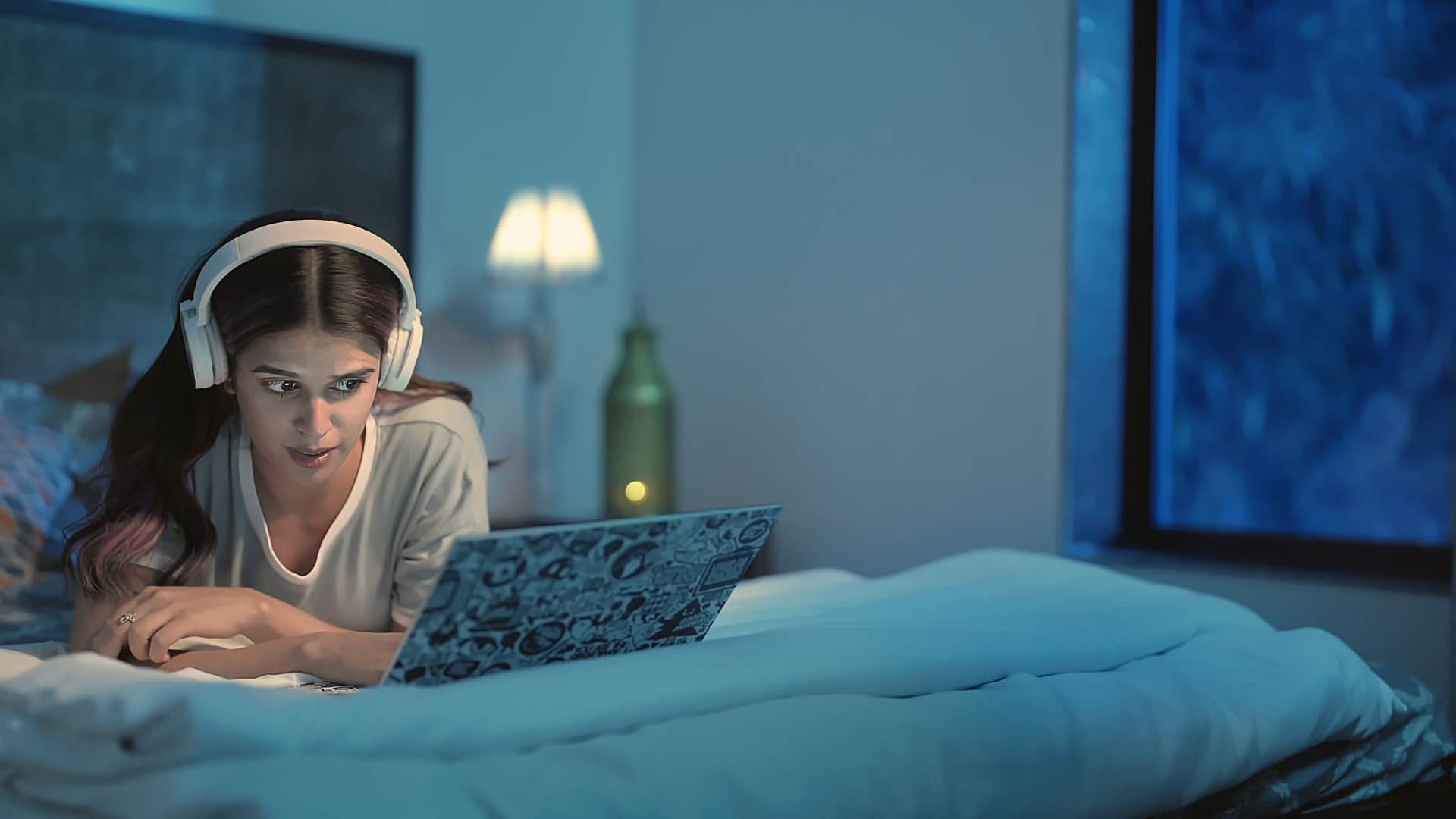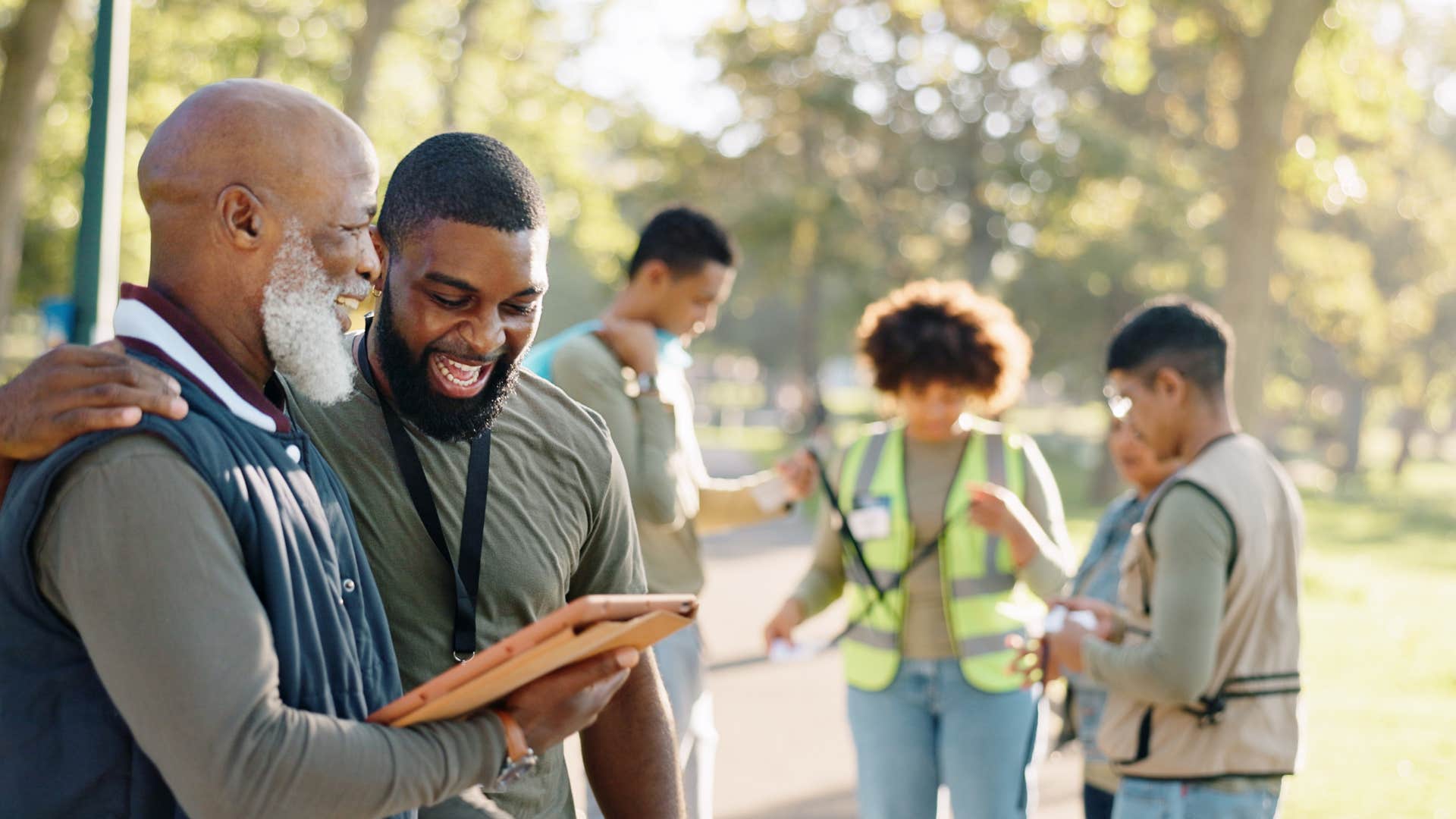5 Psychological Happiness Tricks That Almost Nobody Knows But Everyone Needs
Happiness is a lot closer than you think.
 Maples Images | Shutterstock
Maples Images | Shutterstock We all just want to be happy. That is the life goal. It's been proven that when people are happy, their health improves, their skin brightens, their attention span strengthens, and they have more success at work and home. All of that sounds wonderful, doesn’t it? But how, in this chaotic, jam-packed, and exhausting world, do we find happiness?
It seems like such a long-term goal, something we have to work towards, not something that is accessible right now. I'm here to tell you that you can be happier NOW, just by tweaking a few things in your life. If you want to know how to be happier, here are five ways to do it — even if your default is usually crabbiness.
Here are 5 psychological happiness tricks that almost nobody knows but everyone needs:
1. Engage in thought restructuring
 Perfect Wave / Shutterstock
Perfect Wave / Shutterstock
Everyone tells us these days that to be happy, we must practice mindfulness, live in the moment, and focus on the positive.
While those ideas have their place, I think that the best way to be happier is by focusing on our negative thoughts, the ones that tell us that we are worthless, ugly, or unlovable.
Yes, those. They aren’t comfortable in our bodies, and yet they settle in for a long visit. Try this. Next time you tell yourself that you are unlovable, pull out a piece of paper and write a list of everyone who loves you. When you tell yourself you are ugly, go look at your profile picture on Facebook, you know that one where you look awesome.
When you tell yourself you are worthless, call your mother. She will remind you how worthless you are not. I suggest that if we push back against, and argue with, those negative thoughts it will bring about quicker change than focusing on the positive.
It’s very hard to access those positive thoughts when we are unhappy. The negative ones, however, are right there for the plucking.
2. Wear your happiness
 Yuri A / Shutterstock
Yuri A / Shutterstock
Smiling seems like such a small thing, but it’s not. Did you know that when we use the muscles on our face to form a smile instead of a frown, we change our chemistry, releasing dopamine into our system, which allows for an immediately improved mood?
I know that when my kids were little and I was drowning in the chaos that was my life, smiling at them made my day just a little brighter, if only for a few minutes. And then I smiled at them again because I just couldn’t resist, and there I was, happy again. So I did it all day long — or tried to.
Smiling, even when forced, can trigger the release of mood-enhancing neurotransmitters, leading to feelings of happiness and reduced stress. Research has found that this physiological response can create a positive feedback loop, encouraging more smiling and further improving mood.
3. Co-regulate through touch
 Pixel-Shot / Shutterstock
Pixel-Shot / Shutterstock
Did you know that hugging is one of the best things you can do in your life, for a variety of reasons?
A brief hug produces oxytocin, which helps reduce anxiety. A prolonged hug produces serotonin, which leads to increased happiness.
Hugging relaxes the muscles and reduces tension. Skin-to-skin contact calms down the nervous system. So hug your friends, your kids, your family members, someone who looks sad. Hug away. It’s quick and painless.
Studies show that higher intimacy frequency correlates with greater life satisfaction and reduced stress. This isn't solely about the act itself, but also the positive emotions and connection fostered through intimacy.
4. Stimulate an adrenaline response
 Raushan_films / Shutterstock
Raushan_films / Shutterstock
So this is an interesting thing. Whenever I am feeling blue, I love to watch The Walking Dead. I know.
And yes, I am a grown woman. I never understood why until recently. When we watch a scary movie or an action flick, our body produces adrenaline, and that rush of adrenaline makes us happier.
When I watch The Walking Dead, I get a full hour dose of adrenaline, which can last me well into the night. Skydiving, helicopter skiing, and swimming with sharks have the same results, but they aren’t quite as accessible on a Wednesday night after work. But try them as well if presented with the opportunity.
Watching these types of movies, for some, improves happiness by triggering a rush of feel-good hormones and providing a sense of accomplishment after overcoming a perceived stressful experience.
Research has suggested that this is similar to the experience of riding a rollercoaster, where the anticipation and release of fear, followed by relief, can be pleasurable. For others, it can act as a coping mechanism for anxiety, allowing them to experience and manage their fears in a controlled environment.
5. Contribute meaningfully
 Yuri A / Shutterstock
Yuri A / Shutterstock
It doesn’t take much to give back to the world. We all have excuses about why we can’t volunteer.
We are "just too busy" is usually the first one that comes out of our mouths. But you can give back to the world every day, in small ways. So, reach out to someone every day.
That crabby person running the register? Smile at them. Open the door for someone, just because.
Make (or buy) cookies and bring them to work. Just thinking about doing good can make all the difference. Doesn’t it just make you feel good thinking about bringing cookies to work?
We all just want to be happy. And I would encourage you to reach out to me, the ultimate life coach, to help you work towards that goal. But there are things that you can do in the meantime, right now, to elevate your mood.
Whoever designed human beings installed mechanisms for maintaining mood and keeping us healthy and alive. We modern humans have a tough time accessing those mechanisms because we have forgotten they are there. I have just reminded you. Go forth and use them. Be happy.
Mitzi Bockmann is a NYC-based Certified Life Coach who works with individuals who strive to heal their toxic relationships so they can have their happily ever after. Mitzi's bylines have appeared in The Good Men Project, MSN, PopSugar, Prevention, Huffington Post, Psych Central, among many others.

